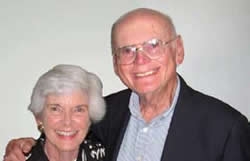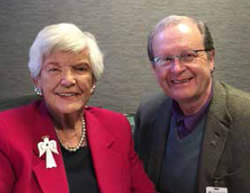
Virginia (Ginny) and Don Sillers named Baylor Health Care System Foundation (now Baylor Scott & White Dallas Foundation) as a beneficiary of Don’s IRA upon the deaths of the survivor of them. This estate gift was in thankfulness to the physicians and staff at Baylor University Medical Center (BUMC) who saved Ginny’s life. Three weeks after she was diagnosed with inoperable liver cancer in 1989, Ginny received a liver transplant at BUMC at age 61, becoming the hospital’s oldest transplant recipient at that time.
After her transplant, Ginny and Don were avid supporters of BUMC and Baylor Scott & White Health, in every way. Ginny served nine years on the Board of Directors of the Baylor University Medical Center Foundation (the Foundation) and she and Don were active members of the Boone Powell Sr. Society, which honors individuals leaving estate gifts to Baylor Scott & White.
Don especially liked the IRA gift idea. Always the astute businessman, he learned that leaving IRA proceeds to their children meant the children would pay income taxes on the remaining balance in the IRA account. This tax would be in addition to estate taxes that could be imposed on that account. Naming the Foundation as the beneficiary of Don’s IRA meant Baylor, as a qualified 501(c)(3) charity, would not pay income tax on its gift. Instead, the full amount could be used to create a permanent endowment.
Asked about their goals for the endowment, Don said, “We hope the endowment’s unrestricted income will give Baylor the flexibility it needs to ensure that all patients have access to the finest medical professionals, the most advanced technology, and state-of-the-art facilities."

About Don Sillers
Don Sillers was an engineer who ultimately became Chairman and CEO of the Texas company his father, Donald A. Sillers, Sr., founded, Peerless Manufacturing Company, a publicly traded company specializing in manufacturing equipment. Mr. Sillers Sr. was known for inventing the Peerless Type “M” Natural Gas Odorizer in 1937.
This was no ordinary invention. It was created out of tragedy. One year earlier, an explosion at a school in New London, Texas, killed 295 children and teachers. The deadly 1936 explosion would not have happened if the leaking natural gas had been odorized and the people in the school were able to smell the leak before it was ignited.
Mr. Sillers Sr. went on to patent additional designs that made possible the delivery of clean, safe fuel for use in homes and businesses. His development of devices for odorizing natural gas helped remove fears of gas accumulations that could lead to disastrous explosions. His odorizer invention was listed as a National Mechanical Engineering Landmark by the American Society of Mechanical Engineers in 1992. Don said his father was his hero.
Don died at Baylor University Medical Center on November 17, 2015. He was 89 years old, and he and Ginny had been married 65 years. One month later, on December 18, President Obama signed the Protecting Americans from Tax Hikes Act of 2015 into law that included a permanent extension of the IRA charitable rollover. This law is now a permanent part of the U.S. tax code, allowing taxpayers age 70 ½ or older to make tax-free charitable gifts of up to $100,000 per year directly from their IRAs to eligible charitable organizations,
A Better Gift
In January, 2016, Ginny’s financial advisor called her with a new idea for Don’s IRA that could help both Ginny and Baylor immediately, based on this permanent law.
Because Ginny was over 70 ½, she was required to take mandatory income distributions on the IRA for the rest of her life and was liable for income tax on those distributions. But she did not need these distributions because of other income sources, so her advisor recommended Ginny designate $100,000 from her IRA to the Foundation in 2016 and continue each year for the next four years. This would complete the estate gift the Sillers had planned.
Because Ginny did not need this income, and because the permanency of the law now allowed charitable pledges, Ginny could see the money put to use for Baylor’s transplant program during her lifetime, and she could receive additional tax benefits each year. Ginny knew Don would have loved this twist of fate.
For Ginny, her $500k charitable pledge, fulfilled through IRA charitable rollover gifts, would work like this:
- She would make annual gifts of $100,000 to the Foundation directly from her IRA.
- These gifts would count toward Ginny’s required minimum distributions taken annually from her traditional IRA.
- The gifts would not be included in Ginny’s adjusted gross income.
- Ginny would not owe income tax on these gifts because they were given directly to a charitable organization, so the gifts were tax-free to her.
Of course, there’s no double dipping here. Since the gifts would not be counted in Ginny’s income, she could not claim an itemized charitable deduction for them. And especially if one does not itemize deductions on their 1040, this is a clear tax win.
